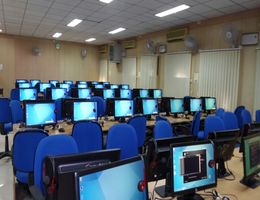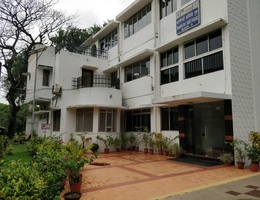Overview
Publications
Recruitment
Intranet
A workshop on ‘Pen aquaculture technology for improved livelihood’ was organized by ICAR-Central Inland Fisheries Research Institute (ICAR-CIFRI), Regional Centre (RC), Guwahati in collaboration with the Assistant Director of Fisheries (ADF), Namsai district, Arunachal Pradesh (AP) at Jona III village on the banks of Bor Beel on Feb. 4, 2020. It was organized for capacity building of the local beel users community of the village on various aspects of pen aquaculture technology developed by ICAR-CIFRI, Barrackpore in different floodplain wetlands (beels) of Assam and Manipur. Fish culture in pen enclosures has been initiated in Bor Beel, Namsai district, AP by ICAR-CIFRI RC, Guwahati as part of a project sponsored by the National Mission on Himalayan Studies (NMHS), G.B. Pant National Institute of Himalayan Environment and Sustainable Development (GBPNIHESD), Almora, Uttarakhand in collaboration with the Directorate of Fisheries, Govt. of AP. The project is aimed at refining and demonstrating pen aquaculture technology in open water bodies of Manipur (completed), AP and Meghalaya. Arunachal Pradesh reportedly has 2,500 ha of natural lakes and floodplain wetlands that are largely unexploited in spite of having high potential for increasing their fish production that can provide enhanced income and livelihood to the poor fishers. Bor Beel alone covers 234 ha water-spread area mostly covered with thick macrophyte mass, that remain grossly underutilized. A total of 35 fishers from the village (including 6 women and 4 youth) participated in the day-long programme. ICAR-CIFRI as the implementing agency and DoF, AP as the implementing partner are making this joint effort for promoting pen aquaculture in Borbeel of AP for its large-scale adoption by the wetland fishers of the state.
The workshop was inaugurated by Shri Bijay Talukdar, Deputy Commissioner, Namsai district. It was attended by high officials of allied departments of Namsai district (Shri Kago Taya, Deputy Director of Agriculture; Shri S. K. Jawal, ADF; Dr. R. D. Jindal, District Veterinary Officer; Shri Sudhir Bhide, District Horticulture Officer; Shri Jhumsar Rime, Additional Director of Textile & Handicrafts), Head, Krishi Vigyan Kendra, Namsai (Dr. Manish Kanwat); district fisheries officials (Shri H. C. Nath, Senior Fishery Officer; Mohindro Singh, Chau Rajendra Hopak and Chow Biman Pangyouk, Fishery Assistants), local participants including Shri Rajeshwar Gogoi (Ex-Member, Panchayat) and the ICAR-CIFRI team (Dr. B. K. Bhattacharjya, Principal Scientist & PI, NMHS Project; Dr. D. Debnath, Senior Scientist & Co-PI; Shri T. Victor Anal, Sanjit Saikia and Satyendra Das, YPs). Shri S. K. Jawal, ADF welcomed the DC, Govt. officials and other participants.
Dr. B. K. Bhattacharjya, Principal Scientist & PI, NMHS Project informed that the NMHS-sponsored project was undertaken with the main objective of enhancing income through culturing fish in pen enclosures. The project has been successfully implemented in Takmu pat, Manipur. Bor Beel, AP presented difficult situation to refine the technology as it was covered with thick macrophyte mass, rendering it unusable for fisheries. He praised the local fisher community for clearing the dense macrophyte mass by employing their own labour, indigenous knowledge and also heavy earth-moving equipments. He stated that efforts are on to make the pens climate-resilient by using strong net-lined split-bamboo screens since the beel receives floodwaters from the adjoining Lohit River. He urged the fishers to make their sincere efforts in implementing the pen culture technology with technical support from the Institute and funding support from the NMHS. He also thanked Shri S. K. Jawal, ADF, Namsai and his officials for rendering whole-hearted assistance in implementing the pen aquaculture project in the district for the first time.
Presence of the DC, Shri Talukdar itself was a motivating factor for the project implementing agencies and fishers. He encouraged the fisher participants to take this opportunity to learn and practice pen aquaculture technology being demonstrated by government departments in Bor beel and then continue beyond the project period with their own resources. Shri Talukdar praised ICAR-CIFRI for making efforts in improving livelihoods of beel fishers of Namsai district, and all the Heads of agri-allied departments for assisting in this endeavour.
The Heads of agriculture and allied departments discussed various Govt. schemes and urged the participants to avail them. Head of KVK offered to provide need-based training and demonstrations. They suggested that integrated farming system involving fisheries, horticulture and animal husbandry would improve the overall productivity and profit as a whole, mostly because wastes (e.g., piggery, poultry) from a sector can be used as inputs in another sector (e.g., fisheries, horticulture).
Dr. Dipesh Debnath, Senior Scientist & Co-PI, NMHS project acknowledged the financial grant given by NMHS, Almora for implementing the pen culture project. He thanked Dr. B. K. Das, Director, ICAR-CIFRI, Barrackpore for facilitating implementation of the project. He also thanked Shri S. K. Jawal and H.C. Nath of DoF, Namsai for their active support in implementing the project activities. Dr. Debnath also thanked the fishers including women for their enthusiastic participation in the programme as well as for sharing their concerns and experience about pen culture during the technical session.











